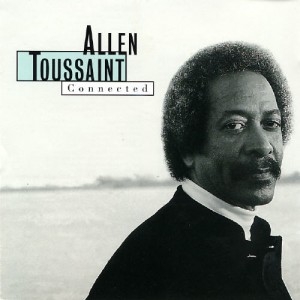1) Egyptian Fantasy; 2) Dear Old Southland; 3) St. James Infirmary; 4) Singin' The Blues; 5) Winin' Boy Blues; 6) West End Blues; 7) Blue Drag; 8) Just A Closer Walk With Thee; 9) The Bright Mississippi; 10) Day Dream; 11) Long Long Journey; 12) Solitude.
General verdict: Consistently brilliant reinventions of old classics — nostalgia at its most creative.
Toussaint's output after his comeback in the
Nineties is somewhat chaotic and confusing: mainly collaborations with other
artists, ranging from authentic soul people like Billy Preston and Irma Thomas
to whitey wannabes (hah!) like Elvis Costello, but also seemingly original
recordings that are hard to locate and probably of little interest, such as a
Christmas album in 1997. By the mid-2000s, however, he had re-developed some
interest in classic jazz, even forming a short-lived team called «Allen
Toussaint's Jazzity Project» with which he made an album called Going Places — wasn't any particular
place where that sucker went, as far as I know, but it did pave the way for a
bigger, grander, and obviously better remembered project: The Bright Mississippi, Toussaint's heartfelt, complex, and overall
brilliant tribute to an age when jazz music was your everyday soundtrack,
rather than a niche thing enjoyed by intellectual snobs, nostalgists, and
non-discerning musical omnivores.
There are no original compositions here, no
blatant signs of «modernity», and almost no vocals (other than a bluesy
delivery on Leonard Feather's ʽLong Long Journeyʼ). But there is a lot of tasteful, seductive,
inspired piano playing on old jazz standards, typically running around 5–6
minutes to achieve complete effect and plunge you into an atmosphere of...
well, probably the closest musical analogy I can come up with is those
mid-Sixties Duke Ellington records like Far
East Suite, which had the distinction, on one hand, of sounding with a
«pre-war» vibe, on the other hand, being even more sophisticated, not to
mention better produced, than the old Blanton-Webster classics. So, The Bright Mississippi is, on one hand,
a thoroughly nostalgic record, but on the other hand, it also tries its hand at
rejuvenating some of those sounds — with modern production standards and a sort
of felt-rather-than-heard idea of not having to tie yourself down with any old
conventions.
Thus, even if ʽWinin' Boy Bluesʼ is credited to
Jelly Roll Morton, it is, in fact, much more of an Allen Toussaint original
variation on the ʽWinin' Boy Bluesʼ theme — the original was a full-band
shuffle with Morton's piano almost inaudible behind the brass section, but this
six-minute piece is really a long slab of solo piano improvisation that has
Toussaint doing more «rolls» than you'd actually hear on any Jelly Roll Morton
LP. Django Reinhardt's ʽBlue Dragʼ is not trying to copy or outdo Django's
gypsy chords or Stephane Grappelli's violin moans, but replace them with
different piano and acoustic guitar parts that preserve, yet also partially
modify and update the spirit of the original in ways that seem surprisingly
fresh and vibrant.
That acoustic guitar, by the way, is played by
none other than Marc Ribot himself — a clear indication that Toussaint wanted
to keep things edgy here, and for
that reason he also brought about Brad Mehldau to play extra piano, Joshua
Redman to blow some sax, Don Byron to handle the clarinet, and a bunch of other
people who are all younger than Toussaint by a good twenty or thirty years but still
completely fall in line behind the old man's conducting baton and understand
perfectly well what he wants them to do. And what does he want them to do? Well, how about take an original
composition by Thelonious Monk, off his fabulous Monk's Dream album way back in 1963, and put the ʽMississippiʼ back
into ʽThe Bright Mississippiʼ — by actually making that theme sound all New
Orleanian, with a bit of trumpet-piano interplay (instead of sax) that would
have surely brought a smile to the face of the late Professor Longhair? Some
might say that Toussaint and the boys trivialize these pieces — others might just
as reasonably object that they are simply putting them back on the street and
breathing real life into them. The only thing that matters, really, is that
there's a lot of real reinvention
going on here, and this is what elevates The
Bright Mississippi over tons of competition.
The whole thing feels so lively that it is not
until the decision to end the album with a hushed, guitar-and-piano-only cover
of Duke Ellington's ʽSolitudeʼ that you discern some real sadness and nostalgia
for a bygone era — a once poignant ode to a lost lover here seems to readdress
its poignancy towards something larger and more elusive in scope. We no longer
live in the Jazz Age, after all, and even the Mississippi is probably not as
bright as it used to be: the grass may not have been greener, but the times
were definitely a bit more innocent, and it does not happen often in the 21st
century that artists, be they old or young, manage to successfully recapture
some of that innocence and make it sound a little deeper, yet just as immediate
as it used to be. I hesitate to call the album an original masterpiece — but
it is a masterpiece of interpretation, and probably Toussaint's single greatest
achievement since Southern Nights. And
the fact that it became the last original recording to be released in his
lifetime is quite impressive, too.







